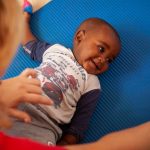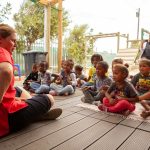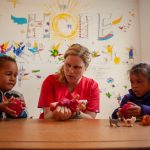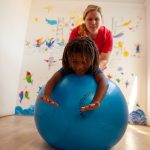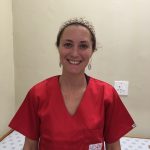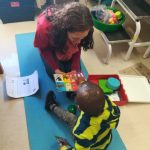In our previous articles we had the privilege of meeting occupational therapists who shared their stories with us. Today, Robyn Meissner explains the process of patients requiring OT sessions and what these sessions entail.
Referrals come mainly from doctors and nurses in the clinics we currently work in (or their referring hospitals).Children are referred to us when a they are behind on or have missed developmental milestones in any developmental area, if their caregivers and teachers are worried about problems regarding writing and learning or if they have congenital or neurological disorders already diagnosed. We can see anything from sitting and walking delays, to behaviour problems, to writing backwards/upside down, to not holding their pencil correctly.
We always start with an assessment so we can try identify where the difficulties and problems are and so that we have a baseline of their abilities to use – we can use this at a later stage to compare and recognise improvements.
Therapy involves using play to practice/exercise/teach and improve their difficulties or delays. We try to involve the caregivers as much as possible within the therapy sessions and provide them with ideas and support on how to help their children at home as they are not always able to come to the clinic frequently in between their doctors’ appointments. These therapy sessions all take place at the clinic where the child is seeing their doctor, on the same day as their doctor and medication appointments. Children and caregivers will continue to see us for appointments until their difficulties are resolved and they are confident in their abilities.
Seeking early intervention (as soon as they start experiencing difficulties) is always best for the child! If there is a delay referring to therapy the difficulties are often more difficult to help resolve and could cause other problems.
One case that comes to mind:
I was referred a little girl at one of the clinics, who was 2yrs8mo old. She was born 1 month premature, weighing 1.62kg and tested positive for HIV after birth. Unfortunately, her family did not attend follow-up appointments and defaulted her medication, they were in struggling with a very poor socioeconomic situation at home. She now had pulmonary TB and malnutrition. My initial assessment placed her at a 1-year old level – she was not walking or talking yet, a delay of about 18months across all developmental areas. She was also extremely traumatised and would cry through her entire clinic visit, she would not let me come near her, even to give her a toy.
I was able to show her parents how to stimulate her development without having to buy toys. We worked slowly for her to gain my trust and eventually she stopped crying and started to play more in therapy sessions, all the while her parents were playing with her at home based on the guidance given. She started walking 4 months after I first saw them. She also started speech therapy which has helped her communication to catch up. She is now 5yrs old, I still see her for monthly sessions – she has continued to improve. Unfortunately, we think she will always be behind her age group in some developmental areas and she is being seen by specialists to help provide appropriate support. Her parents understand her health condition better and are committed to care for her.
This story highlights a couple things:
-
- the significant importance of home stimulation in a child’s development and the difference it makes when the caregivers are encouraged and recognise their responsibilities,
- this is also a great example of the multi-disciplinary team at work to provide holistic care to save and improve a child’s (and their family’s) life – without the counselling from HOPE’s community workers, doctor’s care, nutritional advice and support from the dietician and occupational and speech therapist intervention, she would not be where she is today
{slider2020 HOPE Cape Town – Occupational Therapist Zoné Janse Van Rensburg}
As September focuses on occupational therapy, we are pleased to introduce Zoné Janse Van Rensburg, occupational therapist at the Helderberg State Hospital in Somerset West, Cape Town.
1. How were you introduced to occupational therapy?
I studied at the University of the Free State in Bloemfontein and successfully completed my Bachelor’s degree in 2008. In 2009 I completed my community service at the Port Elizabeth hospital complex in the Eastern Cape Province, where I worked afterwards for another four years. At the same time, I studied Neuroscience at the Witwatersrand University in Johannesburg and successfully completed my studies in 2016.
Subsequently, I worked for three years in a paediatric practice in East London and then moved with my family to Cape Town and founded my own practice in 2017.
This practice has now been in existence for almost 3 years and is in Durbanville at the Stellenberg Therapy Centre. It is a paediatric practice with a special focus on neuroscience and early intervention. Here, I work with a combination of neurological development concept, sensory integration and sensomotoric treatment approach to treat patients either individually or in groups. I also work for various schools, in the neonatal intensive care unit at the Cape Gate Day Clinic and for HOPE Cape Town in Somerset West.
2. Zoné, is occupational therapy what you always wanted to do?
I was so convinced that I would study occupational therapy that I felt it was not necessary to add a second subject to my university application. I knew very clearly that occupational therapy would be my career. Occupational therapy is my passion. I do not think I would have fit into any other career.
3. What are or were the biggest challenges in your work?
Starting my own practice! It is still difficult for me to run my practice because I am less focused on the business and more on the clinical side of things. However, one part cannot survive without the other part if you want to run a practice successfully.
4. What are the best moments in your work?
There have been so many successes in my practice that I feel it is only one BIG SUCCESS. I am happy when I can help my little patients and thus create a basis for a better future for them.



